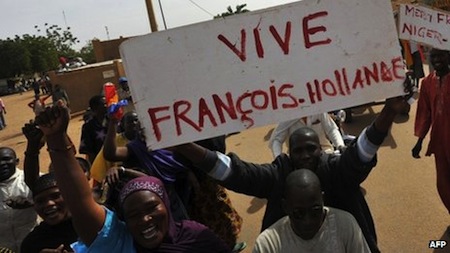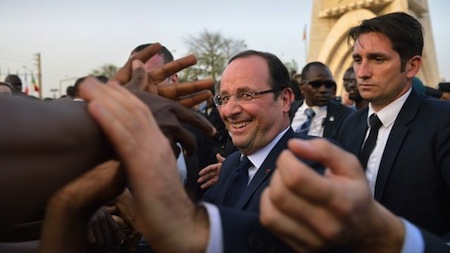Earlier this weekend, French president François Hollande flew to Timbuktu in Mali, where French forces have only in the last week cleared the historic city of Islamist control.![]()
![]()
I was quick to argue that the intervention in Mali wasn’t some neocolonial retreat to Françafrique, and for a three-week military campaign, I’ll be the first to agree that Hollande’s intervention seems to have saved Bamako, Mali’s southern capital, from pending capture — or at least from pressure from Islamist rebels that were quickly closing in on Bamako after locking down control of the northern two-thirds of the country.
But given that the Timbuktu trip had a ‘mission accomplished’ feel to it, after just three weeks of French military effort, I’m not sure whether Hollande will ultimately come to regret such a high-profile event — as former U.S. president George W. Bush learned, prematurely spiking the ball is not smart politics.
For a country that’s often had a troubled post-colonial relationship with its former colonies, especially in north Africa, it’s perhaps an odd thing to see huge crowds of French-speaking Africans praising Hollande over the weekend:
As Mr. Hollande, ringed by security guards, plunged into the crowd to shake hands, some waved banners that said “Papa François, the mysterious city welcomes you.”
“Hollande is our savior,” said Arkia Baby, a 24-year-old college student, who wore a purple batik dress of a style banned by the Islamists. “He gave us back our freedom.”
You might think that Hollande’s success so far in Mali should be helping him at home politically, but budget woes, tax policy and continued economic weakness have nonetheless kept Hollande’s approval ratings incredibly low as he enters only his 10th month in office — only 35% of French voters continue to have confidence in Hollande, opposed to 61% who do not, pursuant to a TNS Sofres poll from January 30.
First and foremost, where does Mali go from here? If and when the French forces leaves, won’t the Islamist and Tuareg rebel forces simply re-emerge from their northern rural enclaves?
In contrast, if French forces really stay long enough to push the more radical Islamist elements out of Mali, won’t they just create a new problem in another country?
Mauritania doesn’t seem like an incredibly bad place for al-Qaeda in the Maghreb to target next.
Given that the French-backed effort to arm rebels in Libya against Muammar Gaddafi might have destabilized Mali by flooding north and west Africa with additional weapons, it’s not too early to wonder if the Mali effort will result in further unintended consequences, like so many falling dominoes. It’s no secret, too, that U.S. aid to the mujahideen in the 1970s and 1980s in Afghanistan empowered the radical Islam that bloomed in the 1990s and turned against the United States by sponsoring al-Qaeda and other terrorist groups and, indirectly, resulted in the current U.S. quagmire in Afghanistan.
So there’s no way to know what follow-on effects the French offensive will have.
And that, of course, is probably a best-case scenario — there’s a risk that France could get stuck fighting an increasingly unpopular stalemate in Mali if it stays.
But even if France could somehow permanently clear Mali of AQIM and radical Islamist influence (and even if it displaces them to Algeria or Burkina Faso or Mauritania or whatever, it probably won’t rid Mali of all of its Islamists), Mali will still have to come to terms with a largely nomadic, Arab Tuareg population in its north that is now less thrilled than ever to be ruled by Bamako.
It’s not like Mali could simply reinstate Amadou Toumani Touré as president, and seamlessly shift back to a normal presidential election after all that’s happened over the past year — Bamako still needs to come to terms with the Tuareg self-determination movement that sparked the initial military coup in Bamako last spring that, in turn, led to the greater destabilization of northern Mali.
It’s important to realize that the National Movement for the Liberation of Azawad (MNLA) has been championing a Tuareg cause that has its roots in the granting of independence to Mali in 1960. The MNLA had no designs on creating a fundamentalist Islamic state in northern Mali, though they originally partnered with Islamist groups strategically, especially the homegrown Ansar Dine (still Tuareg-based, though more Islamist than the MNLA). But the MNLA has increasingly distanced their movement from Ansar Dine, as well as AQIM, the Movement for Oneness and Jihad in West Africa (MUJWA) and other more foreign-backed Islamist groups — especially as the Islamist rebels increasing marginalized the MNLA’s role in northern Mali over the past year.
It was AQIM, remember, not the MNLA, that controlled Timbuktu.
So ultimately, even if the French forces, together with a pan-African force, manage to keep AQIM and the other groups at bay in northern Mali, it certainly seems like Bamako will still have to achieve some sort of political arrangement with the MNLA or other Tuareg representatives if Mali is to achieve any sort of functioning state.
Malian president Dioncounda Traoré has indicated he’s open to talks with the MNLA, but not with Ansar Dine — that may not be enough.
None of this should necessarily detract from the success of the joint French-Malian effort of the past three weeks. But no one in Paris or Bamako or Timbuktu should have any illusions about the obstacles that remain for Mali.


2 thoughts on “François Hollande’s triumphant visit to Timbuktu — and next steps for Mali”